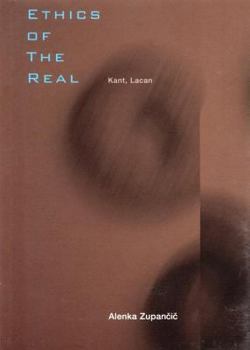Ethics of the Real: Kant, Lacan
Select Format
Select Condition 
Book Overview
The idea of Kantian ethics is both simple and revolutionary: it proposes a moral law independent of any notion of a pre-established Good or any 'human inclination' such as love, sympathy or fear. In... This description may be from another edition of this product.
Format:Paperback
Language:English
ISBN:1859842186
ISBN13:9781859842188
Release Date:April 2000
Publisher:Verso
Length:266 Pages
Weight:0.75 lbs.
Dimensions:0.6" x 5.5" x 8.5"
Customer Reviews
3 ratings
Lacan d'jour
Published by Thriftbooks.com User , 20 years ago
This book is necessary reading for anyone interested in learing about Lacan as well as for anyone already versed in Lacanian theory. Zupancic is a former pupil of Slavoj Zizek, and though some of her style reflects that relationship, for the most part, she does not deploy the same strategy of jokes and movies; so expect nothing but serious philosophical discourse. It tackles with depth and clarity the issue of a "Lacanian ethics," which Lacan himself developed in and after seminar VII on that very topic. Since much of Lacan's seminars are not published in English, it is very nice that Zupancic moves in and out of the body of Lacanian theory to pull together what she is calling an "Ethics of the Real." Perhaps, what is most informative about this book is how it clarifies the distinction between desire and drive in their respective relations to the Real. Unlike most Lacanians, Zupancic is not interested in making outlandish statements, but rather, is engaged in a very serious conversation with Kant and Greek tragedy (she also clarifies why Lacan is constantly interested in tragedy). Indeed, Zupancic is the proverbial student who overcomes her master as this first book of hers already rivals the best of Zizek's own work.
Insight plus clarity
Published by Thriftbooks.com User , 24 years ago
There are lots of clever books about Lacan, but often they are too clever for their own good (or the reader's good), simply compounding Lacan's own obscurity. This is not an easy book but you can't fault it for any lack of clarity. Unlike many Lacanians, she actually gives examples for her abstract claims, since she is not afraid to test the abstract on the concrete. Her analysis of 'Dangerous Liaisons' is brilliantly incisive. What Zizek says about her unquestionable value in the book's blurb and the preface turns out to be a fact. Great book! Don't miss it.
Kant avec Lacan
Published by Thriftbooks.com User , 24 years ago
Man is not as moral as he believes, but he is also more moral than he believes himself to be. The first half of this seemingly paradoxical statement tells us what we already know: beneath a "reputable", ethical facade, man is driven pathologically, he is a merely a slimy effect of symbolically situated will and social edifice. The second half of this statement is of Lacanian/Kantian import, the truly subversive gesture: the subject is (ethically) free qua empty "link" between cause and effect, qua position of enunciation - he is both answerable to the lack in the Other and the cause of it. Find out why Lacan was Kantian and Kant was, in a way, Lacanian - in short, read this book: it is a genuine piece of scholarship.





